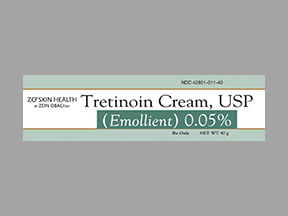
Tretinoin (emollient) Coupons & Savings Card – Discount Prices from $122.31
My prescription
Edit
40GM of 0.05%, Tretinoin (emollient) (1 Tube)
Select pharmacy

CVS
$151.95
COUPON PRICE
Walmart
$122.31
COUPON PRICE
Walgreens
$133.30
COUPON PRICEFree Tretinoin (emollient) Savings Card

Walmart
$122.31
Show this coupon to your pharmacist
ID
LH9368FA4E
PCN
CHIPPO
BIN
019876
GRP
LHX
This coupon is not insurance
More prescriptions for skin discoloration
More prescriptions for skin discoloration
Tretinoin (emollient) dosage forms
Dosage Quantity Price from Per unit 40GM of 0.05% 1 Tube $122.31 $122.31 40GM of 0.05% 2 Tubes $263.61 $131.81 40GM of 0.05% 3 Tubes $404.90 $134.97
| Dosage | Quantity | Price from | Per unit |
|---|---|---|---|
| 40GM of 0.05% | 1 Tube | $122.31 | $122.31 |
| 40GM of 0.05% | 2 Tubes | $263.61 | $131.81 |
| 40GM of 0.05% | 3 Tubes | $404.90 | $134.97 |
Tretinoin (emollient) Warnings
Renova (tretinoin) is a medication that requires careful use due to several potential risks. It is essential to understand these risks and follow precautions to ensure safe and effective use. If you have any questions or concerns, please consult your healthcare provider.
Skin Irritation: Renova (tretinoin) may cause skin redness, burning, peeling, or swelling. Using more than the recommended amount does not improve results and can increase irritation. If you have eczema, your risk of irritation may be higher. Notify your healthcare provider if you experience severe irritation. They may advise reducing the usage frequency, applying a smaller amount, or discontinuing the medication based on the severity of your reaction. Be cautious of using other skin irritants, exposure to extreme temperatures, or if you have eczema.
Sunburns: Renova (tretinoin) can make your skin more sensitive to sunlight and artificial UV sources like sunlamps, increasing the risk of sunburn. This sensitivity may also contribute to premature skin aging or an elevated risk of skin cancer. Higher risk factors include frequent sun exposure, having skin that easily burns, living in hot climates, or working outdoors. Use sun protection measures to minimize risks.
Harm to Unborn Babies: Topical application of Renova (tretinoin) can be harmful to an unborn baby. It should not be used by those who are pregnant or planning to become pregnant. Discuss with your healthcare provider for alternative treatments if you are in this category.
In case of any adverse reactions or if you suspect an overdose, seek immediate medical attention. Always follow your healthcare provider's guidance for safe and effective use of this medication.
Tretinoin (emollient) Side Effects
Common side effects:
- Burning or stinging sensations
- Peeling
- Redness
- Dry skin
- Itching
Less common but important to monitor:
- Changes in the color of the treated skin
Tretinoin (emollient) Interactions
When using tretinoin emollient cream, it's important to be mindful of potential interactions with other skincare products to avoid excessive skin irritation. Certain products can increase sensitivity and should be used cautiously or avoided altogether.
Products to Avoid:
Keratolytic Agents: Ingredients like sulfur, Resorcinol, Benzoyl Peroxide, and Salicylic Acid can intensify skin irritation when used with tretinoin. It's advisable to allow the effects of these agents to subside before starting tretinoin therapy.
Photosensitizing Agents: Medications such as fluoroquinolone antibiotics, thiazide diuretics, sulfonamides, tetracyclines, and phenothiazines may increase skin's sensitivity to sunlight. Using these alongside tretinoin can heighten the risk of phototoxic reactions.
Harsh Skin Products: Avoid using products that contain high concentrations of alcohol, Menthol, spices, or lime, as well as abrasive soaps, cleansers, and cosmetics with strong drying effects. These can exacerbate skin dryness and irritation.
Recommendations:
Moisturizers: Incorporating a non-comedogenic moisturizer into your skincare routine can help alleviate dryness and irritation associated with tretinoin use.
Sun Protection: Tretinoin can make your skin more susceptible to sunburn. It's essential to use a broad-spectrum sunscreen with an SPF of at least 15 and wear protective clothing when outdoors.
Consult Your Healthcare Provider: Before introducing new skincare products or medications, consult with your doctor or pharmacist to ensure they are compatible with tretinoin and won't cause adverse reactions.
By carefully selecting complementary skincare products and adhering to these guidelines, you can enhance the effectiveness of tretinoin therapy while minimizing potential side effects.
